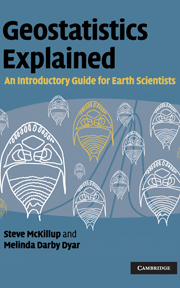Book contents
- Frontmatter
- Contents
- Preface
- 1 Introduction
- 2 “Doing science”: hypotheses, experiments and disproof
- 3 Collecting and displaying data
- 4 Introductory concepts of experimental design
- 5 Doing science responsibly and ethically
- 6 Probability helps you make a decision about your results
- 7 Working from samples: data, populations and statistics
- 8 Normal distributions: tests for comparing the means of one and two samples
- 9 Type 1 and Type 2 error, power and sample size
- 10 Single-factor analysis of variance
- 11 Multiple comparisons after ANOVA
- 12 Two-factor analysis of variance
- 13 Important assumptions of analysis of variance, transformations and a test for equality of variances
- 14 Two-factor analysis of variance without replication, and nested analysis of variance
- 15 Relationships between variables: linear correlation and linear regression
- 16 Linear regression
- 17 Non-parametric statistics
- 18 Non-parametric tests for nominal scale data
- 19 Non-parametric tests for ratio, interval or ordinal scale data
- 20 Introductory concepts of multivariate analysis
- 21 Introductory concepts of sequence analysis
- 22 Introductory concepts of spatial analysis
- 23 Choosing a test
- Appendices
- References
- Index
5 - Doing science responsibly and ethically
Published online by Cambridge University Press: 05 June 2012
- Frontmatter
- Contents
- Preface
- 1 Introduction
- 2 “Doing science”: hypotheses, experiments and disproof
- 3 Collecting and displaying data
- 4 Introductory concepts of experimental design
- 5 Doing science responsibly and ethically
- 6 Probability helps you make a decision about your results
- 7 Working from samples: data, populations and statistics
- 8 Normal distributions: tests for comparing the means of one and two samples
- 9 Type 1 and Type 2 error, power and sample size
- 10 Single-factor analysis of variance
- 11 Multiple comparisons after ANOVA
- 12 Two-factor analysis of variance
- 13 Important assumptions of analysis of variance, transformations and a test for equality of variances
- 14 Two-factor analysis of variance without replication, and nested analysis of variance
- 15 Relationships between variables: linear correlation and linear regression
- 16 Linear regression
- 17 Non-parametric statistics
- 18 Non-parametric tests for nominal scale data
- 19 Non-parametric tests for ratio, interval or ordinal scale data
- 20 Introductory concepts of multivariate analysis
- 21 Introductory concepts of sequence analysis
- 22 Introductory concepts of spatial analysis
- 23 Choosing a test
- Appendices
- References
- Index
Summary
Introduction
By now you are likely to have a very clear idea about how science is done. Science is the process of rational enquiry, which seeks explanations for natural phenomena. Scientific method was discussed in a very prescriptive way in Chapter 2 as the proposal of a hypothesis from which predictions are made and tested by doing experiments. Depending on the results, which may have to be analyzed statistically, the decision is made to either retain or reject the hypothesis. This process of knowledge by disproof advances our understanding of the natural world and seems impartial and hard to fault.
Unfortunately, this is not necessarily the case because science is done by human beings who sometimes do not behave responsibly or ethically. For example, some scientists fail to give credit to those who have helped propose a new hypothesis. Others make up, change or delete results so their hypothesis is not rejected, omit details to prevent the detection of poor experimental design, and deal unfairly with the work of others. Most scientists are not taught about responsible behavior and are supposed to learn a code of conduct by example. Considering the number of cases of scientific irresponsibility that have been exposed, this does not seem to be a very good strategy. Thus, this chapter is about the importance of behaving responsibly and ethically when doing science.
- Type
- Chapter
- Information
- Geostatistics ExplainedAn Introductory Guide for Earth Scientists, pp. 45 - 50Publisher: Cambridge University PressPrint publication year: 2010



